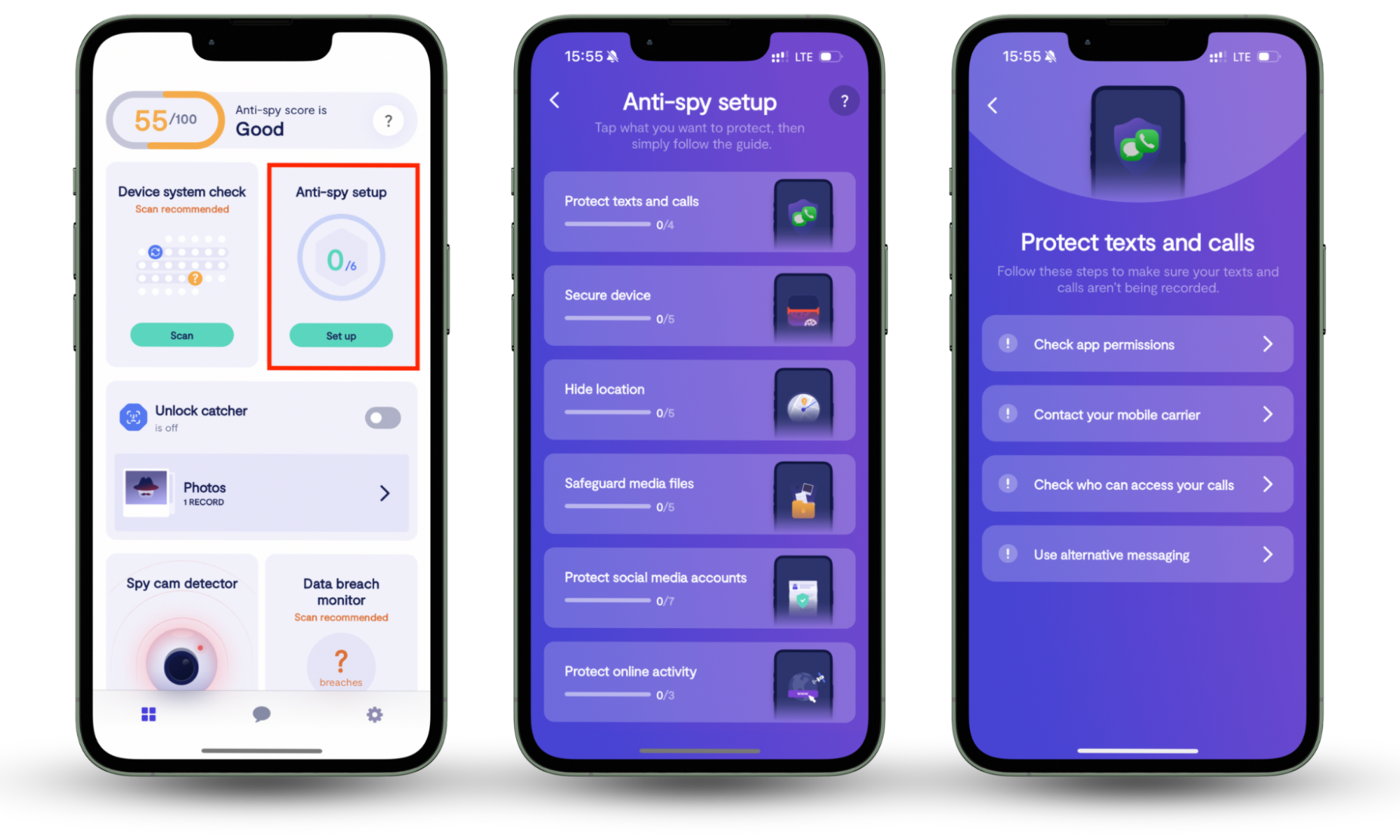Table of contents
- Things a VPN hides
- A VPN hides your IP address
- A VPN hides your geo-location
- A VPN hides your search history
- A VPN hides your downloads
- A VPN hides your personal data
- A VPN hides your medical diagnosis and health conditions
- A VPN hides travel accommodations
- A VPN hides torrenting
- Things a VPN does not hide or protect
- A VPN can not hide your account activity
- A VPN can not protect your device from viruses
- A VPN can not hide your absolute identity
- Do VPNs prevent tracking location by IP address?
At Clario, we have many users asking what a VPN hides. It’s a great question, as there can be some confusion about the kind of security a VPN can and cannot offer.
Here, we’ll delve into the world of VPNs and find out, once and for all, what a VPN hides. Just as crucially, we’ll explore what they don’t.
Things a VPN hides
- IP Address
- Geo-Location
- Search History
- Downloads
- Personal Data
- Medical Diagnosis and Health Conditions
- Travel Accommodations
- Torrenting.
A VPN hides your IP address
Your public IP address is a unique number that identifies you and your device when you browse online.
It is used by websites to serve you tailored content depending on what you have been browsing.
This can be useful to enable you to enjoy a smoother, more personalized experience online. However, if your IP address is shared with third parties, such as online trackers, then it can lead to significant disruption via a bombardment of unsolicited ads and pop-ups.
In this situation, enhanced security measures can come in useful, and VPNs can be very effective as they hide IP addresses and encrypt your internet traffic. If anyone is monitoring your behavior, then rather than seeing your IP address and any information connected to it, they will only be able to view the VPN server’s IP address instead.
A VPN hides your geo-location
Does a VPN hide your location? The answer is ‘YES.’ It can be a great tool to ensure no one knows your precise whereabouts.
Your IP address is usually associated with a geographic location (and leads to websites and apps pushing localized content on you). Although not a specific address, there will be enough information available to learn the country and town or city you are in.
VPNs hide your location when you connect to them. Instead of seeing where you are, trackers will only be able to find out the location of a VPN’s server. This often means you can choose the country you want to be in – which can also be very useful in not only keeping your actual location secret but also enabling you to access the geo-restricted content on streaming services such as Netflix too.
A VPN helps you protect your privacy online, but it's only part of the solution—your device must also be secure. That's where Clario Anti Spy comes in. This powerful anti-spyware solution checks your iPhone or Android for hidden jailbreaks, rooting, and data breaches. It also provides an Anti-spy setup to guide you every step of the way to enhance your privacy, from safeguarding texts and calls to securing social media accounts and online activity.
Here's how to run an Anti-spy setup with Clario Anti Spy:
- Download Clario Anti Spy and subscribe to create an account.
- Tap Setup under Anti-spy setup.
- Select a category—e.g., Protect online activity—and work through the on-screen instructions.
- Repeat the process for other categories on the screen.
- If you run into any issues, tap the Messages icon at the bottom of the screen to connect with a security expert 24/7.

Exclusive to Android, Clario Anti-Spy includes a Virtual location feature to hide your real location. This is useful for maintaining anonymity even when you're not using your VPN. To turn it on, tap Setup under Virtual location and follow the prompts.
A VPN hides your search history
If you are looking to keep your search history to yourself, then you might consider deleting it from your web browser manually. Doing so and clearing any cookies will completely remove this, right?
Well, not quite. In fact, it’s likely that your Internet Services Provider (ISP) will have details of your digital footprints and information on which websites they have visited. So, does a VPN hide the websites you visit?
Yes, using a VPN can be far more effective in keeping your browsing history alongside any search terms or links you have followed to yourself. It does this by routing your traffic through an encrypted tunnel. This means that although an ISP will be able to discern the activity that is taking place, they will not be able to understand it. A VPN like this can be useful when keeping your browsing private and using public Wi-Fi networks in bars and cafes, too.
A VPN hides your downloads
As with keeping your search history secure, a VPN is equally as useful in preventing your ISP from learning what you have been downloading onto your device. Again, the secure encryption a VPN offers is invaluable in keeping your online activity private.
However, it is important to remember that although you can keep the content of your downloads away from prying eyes, you still need to abide by copyright rules. If you access pirated movies or music, then this is still illegal whether you are found out or not.
It is always sensible to avoid accessing any content that might be infringing on someone’s intellectual property.
A VPN hides your personal data
VPNs can be highly effective in keeping your personal details – such as banking account information and credit card numbers – safe, particularly from man-in-the-middle attacks.
These usually take place when you are using a public Wi-Fi spot like those found in cafes or restaurants. Networks like this are usually unsecured, meaning your personal data can be extremely vulnerable to attacks. Perhaps a cybercriminal will be able to access your sensitive data or just hack into your connection.
Again, using a VPN can enhance your security in this situation. If you connect to a VPN before going online in a public hotspot, then all your traffic is encrypted and secure.
A VPN hides your medical diagnosis and health conditions
In the digital age, many personal details surrounding health conditions are available online. Which could put this at risk of being exposed if the appropriate security precautions are not in place.
Many healthcare providers and facilitators use private networks secured by a VPN. This is to ensure that anything confidential about a patient, such as their ailment or diagnosis, is only accessible to those who need to know this information.
A VPN hides travel accommodations
We all want the best deal for a holiday or trip. But the best prices don’t often appear the first time around, meaning we often have to input various combinations of dates and locations to find the most suitable.
Unfortunately, the cookies on hotel and airline websites are able to identify user behavior and repeat travel searches via your IP address. By using tracking tools, advertisers can target anyone caught looking for a holiday with an array of ads and promotional content.
A VPN can be the most effective way of preventing this from happening. Not only do they help you avoid advertisers, but they also browse anonymously to ensure you can source the most competitive deals.
A VPN hides torrenting
Torrents are files and folders shared between users on a certain network and often give them access to certain pieces of online content. Every time you torrent without using a VPN to keep your IP address safe, then you are potentially exposing yourself to hackers every time you access a file or folder.
The best option is to use a VPN to keep anyone from learning your IP address and all the personal details associated with it.
Make sure you use a powerful VPN to take advantage of all the above-mentioned advantages.
Things a VPN does not hide or protect
While VPNs are obviously invaluable tools in enhancing your online security, there are certain things they cannot do to help keep your personal details secure. It’s wise to understand what these potential vulnerabilities are so you have a broad view of any potential vulnerabilities in your security.
A VPN can not hide your account activity
When you log into a website or a social media account such as Facebook or Instagram, then this platform will know who you are by your username and password.
Even when using a VPN, you are providing this website with identifying information connected to a personal profile. This can include name, date of birth, address, mobile number, and more.
A VPN can not protect your device from viruses
VPNs are highly effective when you are looking to keep your behavior on the internet to yourself or ensure no one can learn your IP address.
However, this is not the same as anti-virus software. If you inadvertently access malware via a phishing attack or download infected files onto your device, then there is nothing a VPN can do to keep you safe.
A VPN can not hide your absolute identity
While a VPN can conceal your browsing behavior, there are still other online indicators that can reveal who you are.
Your search engine might record your history on the web and link this to your account. Website cookies and other trackers can also follow your online identity too. If you want to keep your whole identity secure, then be aware of other vulnerabilities and do not leave everything in the hands of your VPN.
Do VPNs prevent tracking location by IP address?
Yes, a VPN can hide your IP address, and this can cover some information about your general location.
But this is not the same as location tracking. Unfortunately, your location can still be tracked by GPS even if you have a VPN turned on. If you do have a VPN turned on, you only need to go to Google Maps to realize that your location is still the same.
As we’ve seen, a VPN is just one tool in the fight to keep yourself safe and secure online. For a more comprehensive experience when it comes to protecting your privacy online (and also offline), install Clario Anti Spy.


